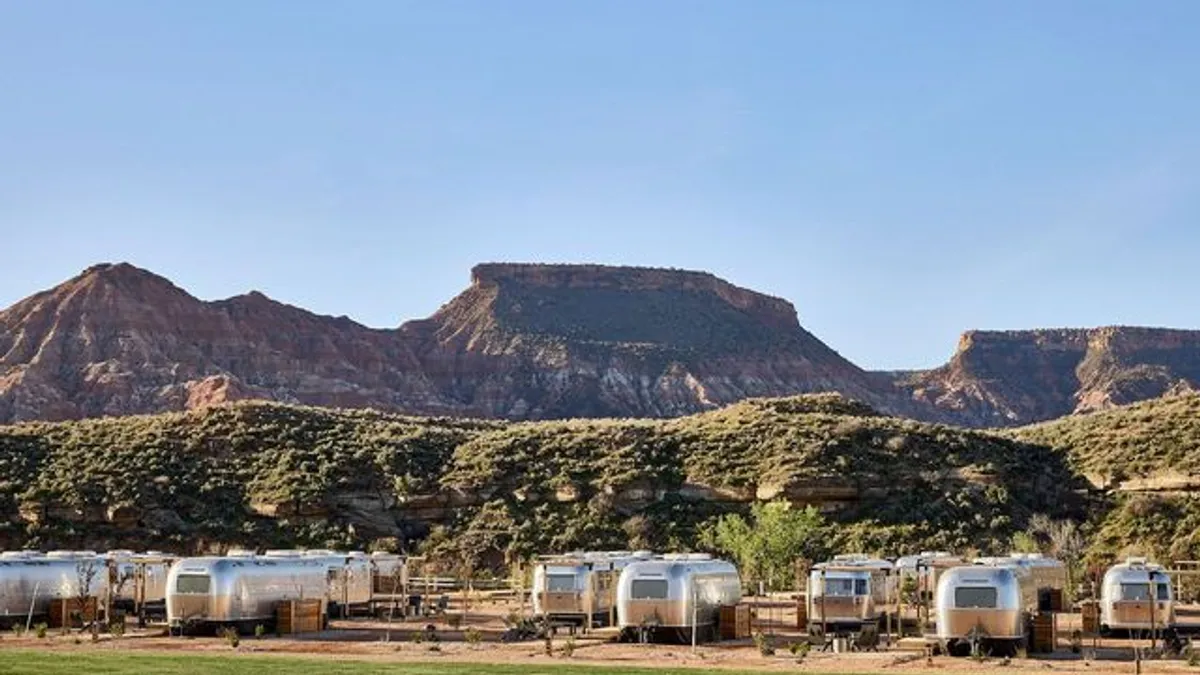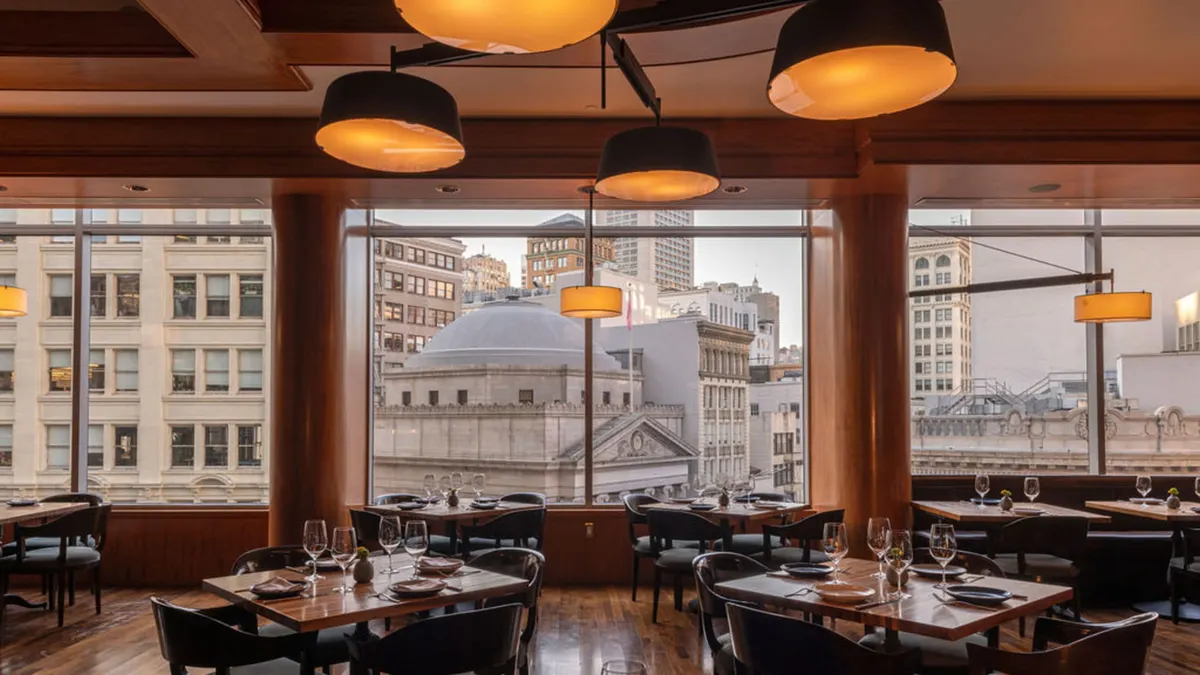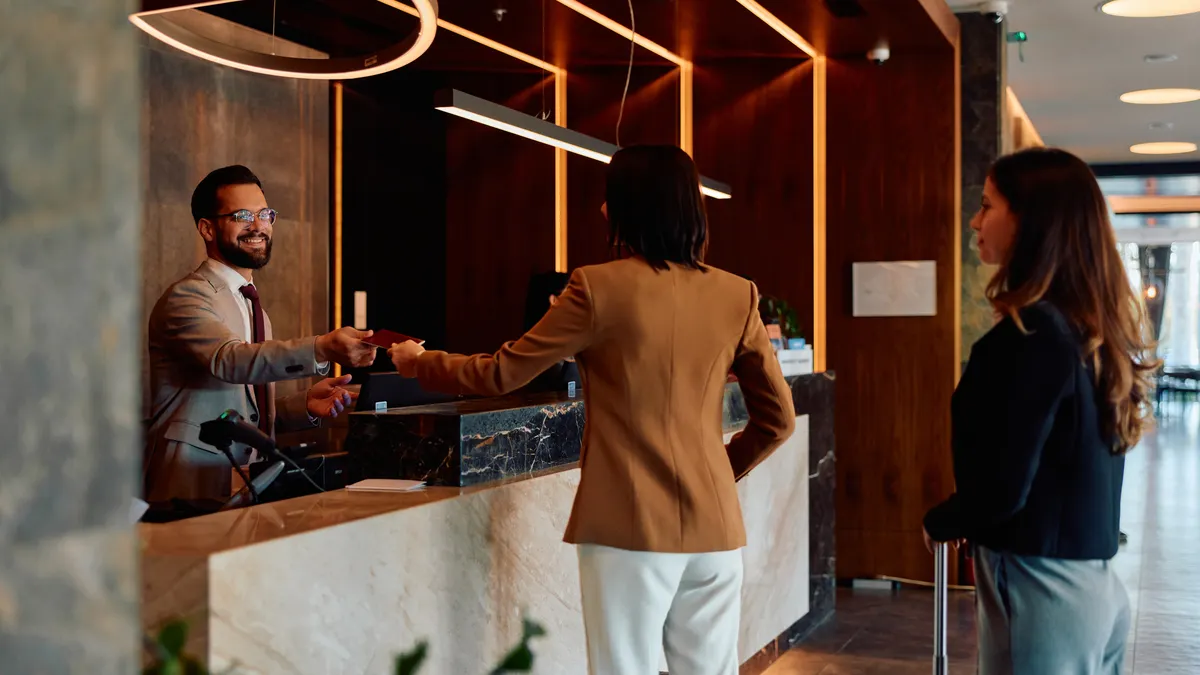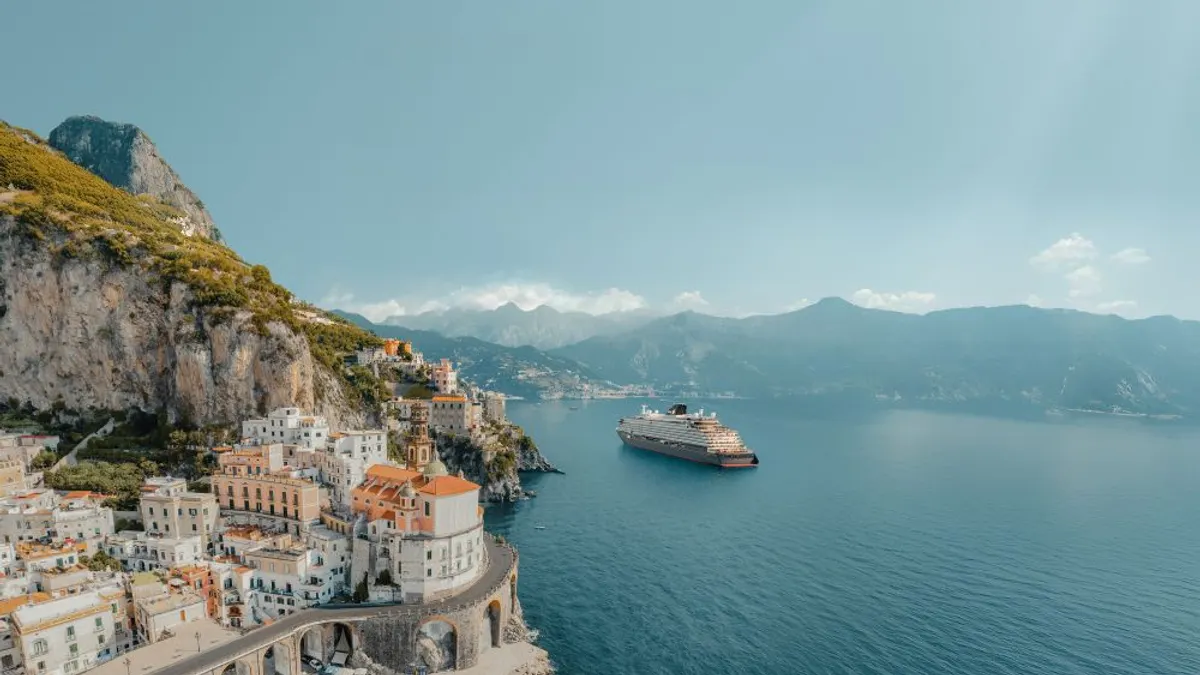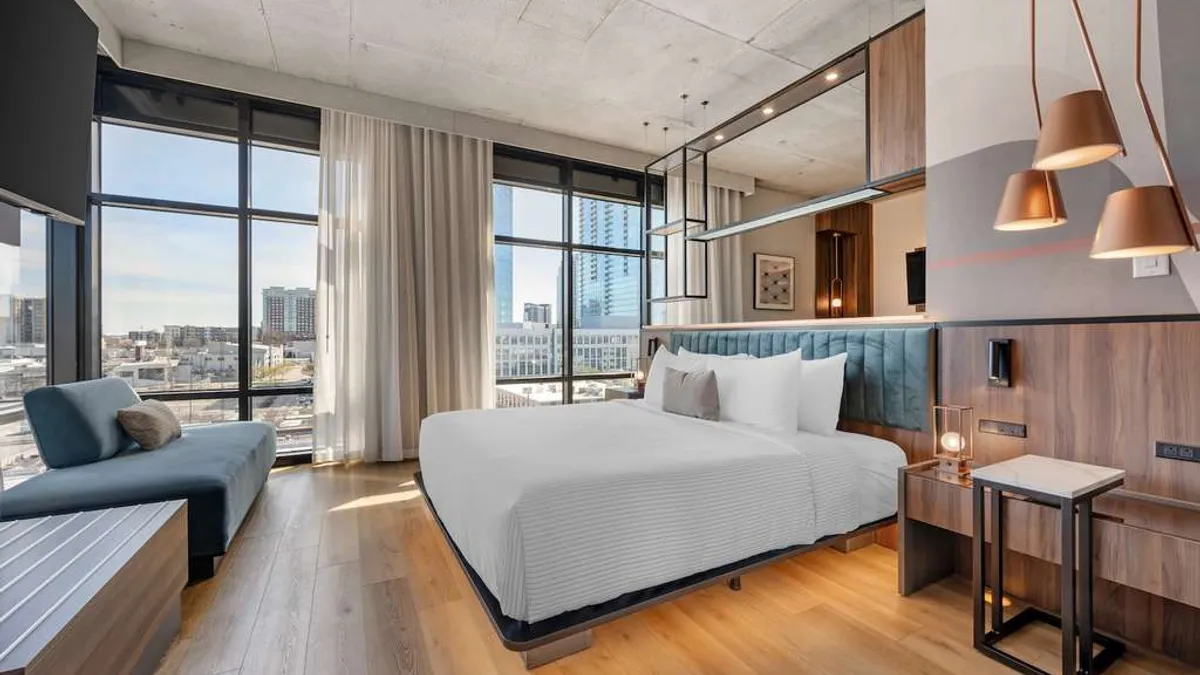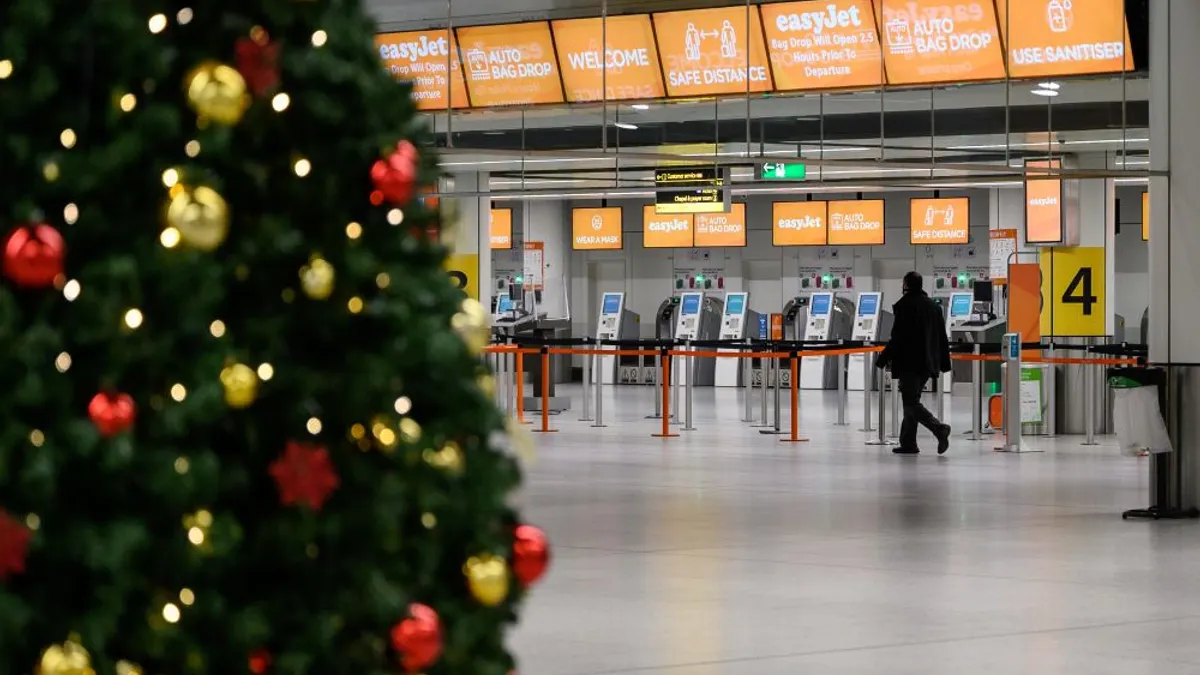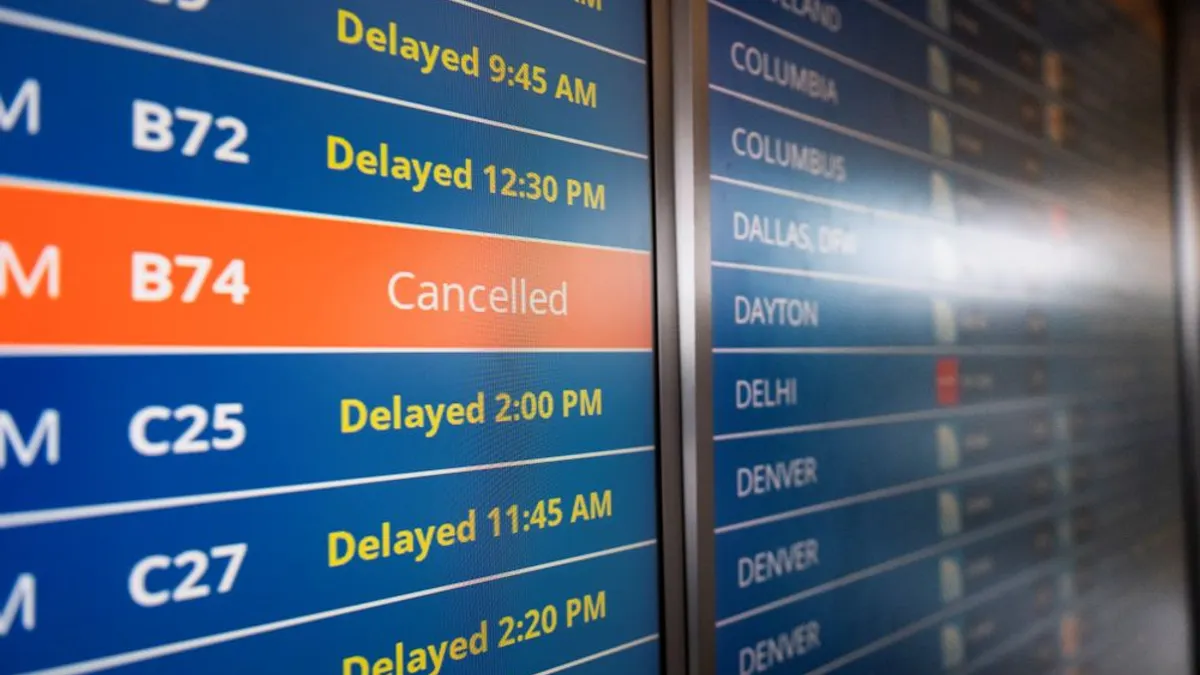Travelers of all types are itching to get outdoors — and now hotel operators are making it easier than ever to do so.
For Choice Hotels International, this looks like collaborating with AllTrails to give guests access to hiking and biking routes or adding outdoor amenity space. For other brands, like Waterton and Gravity Haus, this looks like locating properties near National Parks.
But Hilton has taken connecting with the outdoors one step further — partnering with “glamping” company AutoCamp to provide guests with nontraditional outdoor experiences and stays, including in Airstream travel trailers, cabins and luxury tents.
As travelers continue to crave these unique outdoor-centric accommodations, some hospitality experts say it won’t be long before other major hotel operators follow suit with similar partnerships.
Leaders at global design firm HKS, responsible for the design of the AutoCamps in Joshua Tree, California, and Zion, Utah, shared with Hotel Dive what’s driving the glamping trend and how hotels can cater their design and offerings to attract outdoor enthusiasts.
An innate desire
The increased desire by travelers to connect with nature is an innate one, HKS’ economics practice director, advisory, Ben Martin, told Hotel Dive.
Humans were “designed to be in and connecting with nature, but over the years, through a pursuit of our own comfort, we've put ourselves in environments that are built and that are safe, and where risk has been reduced, because that's what you would want to do if you wanted to stay alive, right?” Martin said.
“Consequently, 55% of the world is now living in an urban environment, which means [the majority] of our time these days is indoors,” he continued. “[There’s] this mismatch between where we were designed to be and where we have found ourselves.”
Despite the everyday conveniences and comforts of indoor life, people are beginning to realize something is missing — being outdoors and the memorable experiences that accompany it, Martin said.
It’s “those magic moments when you walk out and there isn't a lot of light pollution and you can lie down on the ground and look up at the stars, and the stars and the sky [look] bigger than you've ever seen it before,” Martin explained. “And hopefully, you've managed to get rid of some of the noise and you can hear the sounds of nature, and you’re listening and connecting again with nature in a very real way.”
This has led all types of travelers — from families to business groups to couples on romantic getaways — to turn to outdoor-centric trips, Martin noted, some seeking the relaxation they offer and others the adventure.
The number 1 reason guests will travel in 2024 is for rest and relaxation, according to Hilton’s 2024 Trends Report. But a desire for unique experiences is also driving travel, with nearly half of those surveyed in the report saying they will prioritize exploration and adventure this year.
For some, outdoor amenities coupled with a traditional hotel stay are suitable, but others seek a more immersive outdoors experience. AutoCamp properties, HKS noted, provide guests that deep connection with nature without sacrificing the comfort of luxury.
A distinct design
AutoCamp is where “boutique hotel meets nature escape,” the California-based brand, founded in 2013, says on its website. AutoCamp’s portfolio of luxury “glamping” stays spans some of the top leisure destinations in the U.S., including Zion, Utah; Asheville, North Carolina; the Catskills in New York; and Yosemite and Joshua Tree, California. And more are in the works.
Each location, HKS Regional Practice Director of Hospitality Michael Strohmer said, is distinctly designed to highlight its destination and surrounding environment.
To design the bespoke Joshua Tree and Zion AutoCamp locations, the firm began with evaluating “the guests’ experience from the point of arrival,” Strohmer said. From there, every aspect of the property and its locale are assessed, even down to the region’s weather patterns, to make sure the property’s accommodations and offerings are “truly site-specific and connected to nature.”
According to Strohmer, there are a lot of parallels between designing an AutoCamp property and designing a more traditional resort with a nature component — say, an oceanside property.
In the design process for each, HKS not only evaluates how the surrounding environment can enhance the guest experience, Strohmer said, but also how the development’s design can contribute to the preservation of the destination.
Another parallel is in the amenities. AutoCamp incorporates amenities typically found in a luxury hotel, like gourmet food and beverage offerings, communal gathering spaces, swimming pools and, at some locations, meetings and events spaces — but with a twist.
The gathering spaces, for example, are not in a traditional lobby or bar setting but rather around a campfire, where guests can gather with those in their party or other travelers.
“These communal spaces are more approachable than the formality of a lobby lounge, or something that you'd see in a more traditional [hotel] space,” Strohmer said.
Martin noted that the human connection bolstered by these types of gathering spaces ties back to travelers’ innate desire to connect with one another in nature.
“Part of this [AutoCamp] experience is going out, pushing yourself a little, maybe going on a hike, and maybe it's really hot, and maybe you're a bit uncomfortable. But at the end of the day, if you come back together — maybe you get around the campfire and are able to share a really good meal with each other — you have this wonderful sense of reward and achievement … [that] enhances the quality of the experience,” Martin said.
Hotels taking note
As these nontraditional outdoor-centric lodging options become more popular among travelers, hotels are looking for ways to meet guests where they are.
“We know today’s travelers are craving adventures when planning their next trip, and that’s why we look for innovative and like-minded partners like AutoCamp,” Chris Silcock, president of global brands and commercial services at Hilton, said in a statement.
A variety of major hotel operators are looking at similar partnerships or offerings, Martin noted, including Marriott International, Margaritaville and Accor — and on a global scale.
Margaritaville President of Development Jim Wiseman told Hotel Dive last month the lifestyle company has launched RV resort brand Camp Margaritaville, with RV, cabin and cottage stays for guests. “A deconstructed hotel,” he called the brand.
In France, Accor has piloted a type of accommodation it calls a “flying nest,” which uses converted shipping containers as mobile guest rooms. The unique unit is aimed at guests seeking “exclusive and intense experiences,” according to Accor. Martin said the “nests” have been placed in top outdoor destinations like ski resorts.
Temporary structures like these will likely continue to garner interest from the big brands, Martin noted, because they allow operators to pop up in destinations they may not otherwise get planning consent to build at.
These types of accommodations are “scalable, sustainable and can get a high return [on investment],” Martins said, making them an advantageous option for operators.
For hotels that aren’t set on the alternative accommodation route, though, ramping up outdoor experiences and amenities on-property is a good place to start to cater to the growing demand, the HKS team noted.



